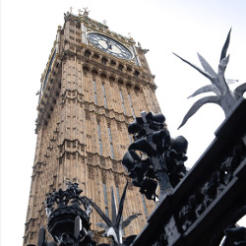A Parliamentary committee's report on the collapse of Kids Company was “too sweeping and over the top” in its condemnation of trustees - because of a “shortage of time” spent working on it, a committee member said last week.
Paul Flynn, Labour MP for Newport West and a longtime member of the Public Administration and Constitutional Affairs Committee, told Civil Society News that "these things are never as simple as they should be,” and that his committee had made mistakes.
“We were a bit sweeping in our condemnation," he said. "It was accurate as far as the chair went but I think trustees have very difficult tasks to perform and there would be problems if they interfered with the work of staff on a day-to-day basis. There’s a feeling that trustees are not certain what their role is and that criticism was over the top generally.
"It’s one of the problems of all select committees. There is never enough time. I am very critical of the way we operate. There’s a shortage of time and we are usually under-prepared. We have this great burden to reorganise the entire world in our image. We should have done a more in-depth investigation into the role of trustees. I would certainly moderate the criticism that we made as far as the other trustees are concerned as they were well intentioned.”
Flynn’s comments were in response to a blog by Andrew Purkis that criticised PACAC’s assertion that trustees were “wilfully blind or incompetent”.
“I didn’t sign the PACAC report or vote for it,” said Flynn. “While I strongly support it, I think it only applies to chair Alan Yentob. I met one of the other trustees and he made a very powerful case that he’d raised many of the issues during his time as a trustee.”
Flynn said one of the report’s biggest failings was its lack of mention about Prime Minister David Cameron's relationship with Kids Company chief executive Camila Batmanghelidjh or the failings of Big Society.
“There is a great gap in the report in that there is no mention of the PM or Big Society - which is absolutely key to the problems of the last five and a half years. Camila Batmanghelidjh was there at the launch of Big Society in Downing Street and was its poster girl. The money moved from the Department of Education to the Cabinet Office, where it was used as a slush fund by Dave.
“So when everyone else said no, the civil servants said it wasn’t wise and ministers were worried about it, a ‘Dear Dave’ letter appeared and the money was paid over their heads and it was operated as a slush fund.
“Big Society has escaped uncriticised. But the whole point with Big Society was that it was easy to replace expensive public services with cheap private services that were better value. And if anything has been proved wrong in this case, it is that,” said Flynn.
Jenkin: 'Stop Charity Commission cuts'
Last week Bernard Jenkin, chair of PACAC and Conservative MP for Harwich and North Essex, told Parliament the committee had found “an extraordinary catalogue of failures of governance and control”.
“The final responsibility for failure rests with the trustees of this charity. The only conclusion that anyone can reach is that they either did not know what was going on in the charity or they knew and failed to act,” he said.
Jenkin said cuts to the Charity Commission’s funding needed to stop and for it to be given greater powers than outlined in the Charities (Protection and Social Investment) Bill.
“The Government need to reverse cuts to the Charity Commission to enable it to carry out its statutory function,” he said. “We also recommend that the Charity Commission take new powers to hold hearings and to produce reports and recommendations about charities. It really should not fall to a Select Committee of the House to produce reports on the activities of individual charities."
Jenkin said the regulator had a "statutory duty to prevent, detect and tackle abuse and mismanagement in charities" but that it did not do so with Kids Company.
"Prior to 2015 the Charity Commission did not engage with Kids Company, because it received very few complaints… But in order to attract complaints, the Charity Commission should have a much higher profile as an avenue for complaints and should be equipped and funded to do more to provide scrutiny and, more importantly, advice and support to struggling trustees.”
Jenkin said the Committee recommended “even more powers for the Charity Commission than those in the Charities Bill” – including the power to hold hearings.
“We want the Charity Commission to have the power to hold legally privileged hearings, like those of a statutory inquiry, so that it can hear and receive evidence that cannot be impugned in the courts,” he said. “That would mean that people with concerns about charities could go to the Charity Commission without the fear of losing their job, of reprisals or of being traduced in the press. The Charity Commission would be able to hold proper hearings and people could speak to it without fear or favour, as they do before Select Committees.
He also called for the Charity Commission to offer advice about courses for trustees.
“We very much want the Charity Commission to recommend courses so that trustees have somewhere to go to learn. The Institute of Directors runs courses for non-executive directors. Where is the equivalent for charity trustees, who have just as onerous a set of responsibilities? It is not the executives and the chief executive who are responsible for the conduct of a charity, but the trustees, who are jointly and severally liable, and it is not just the chairman who is responsible, but all the trustees.”









